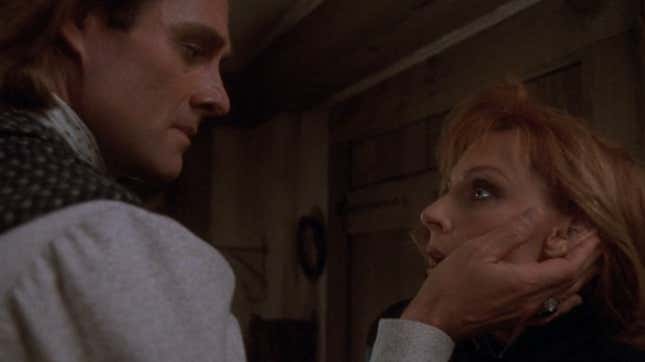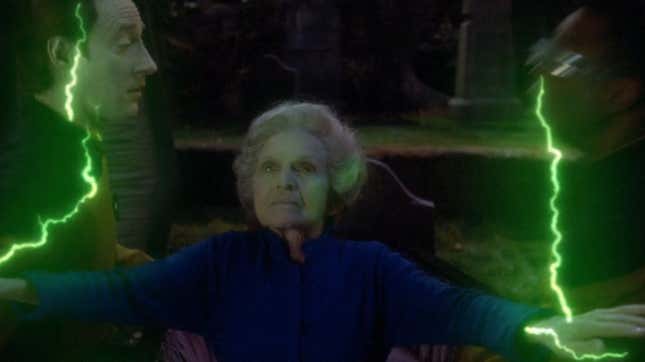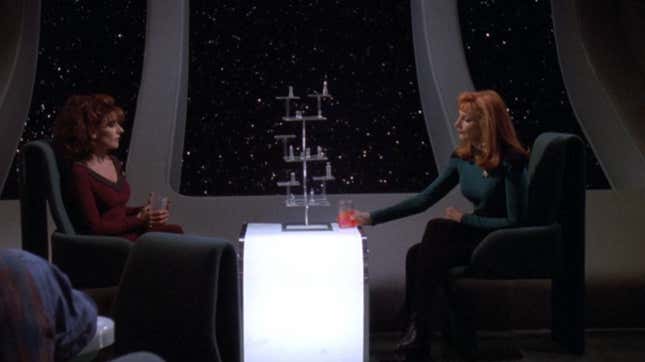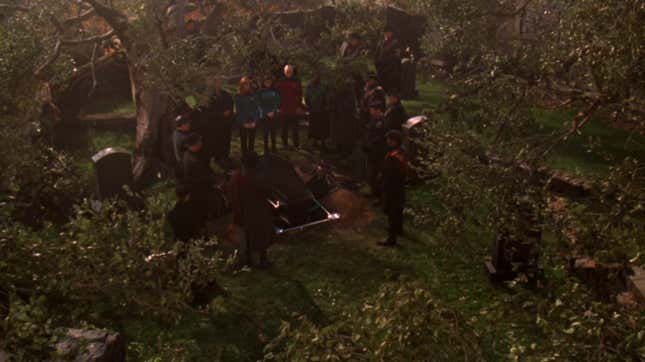30 Years on, TNG’s Ghost Sex Episode Remains as Unhinged and Awful as Ever
It is a banner week for questionable Star Trek anniversaries, but while earlier this week we found at least something to admire in Voyager’s bold exploration of the Warp 10 threshold and space-amphibian evolution, there is very little to admire in the other major milestone. Thirty years ago today, The Next Generation took us to Planet Scotland in “Sub Rosa,” where Beverly Crusher exchanged all thought of character agency for 40 minutes in exchange for some generational family ghost lovin’.
Yes, my friends, it’s the ghost candle sex episode. But how bad can the ghost candle sex episode really be? The answer is very. Very bad.
On the planet Scotland (okay, it’s Caldos IV, a planet that has been terraformed to basically be Scotland, where everyone dresses like it’s the turn of the 20th century and the governor regularly reminds people there’s things like public caber toss events happening, just so you really know it’s planet Scotland), the Enterprise has taken Dr. Crusher to attend the funeral of her grandmother, Felisa Howard. Shortly after laying her grandmother to rest—and immediately becoming mesmerized by a handsome, gigantically-foreheaded stranger at the cemetery—Beverly is swept into the peculiar tonal disparities of Star Trek’s attempt to do its own bodice ripper-style romance.
Star Trek has thrived across its entire existence by putting its own spin on genres beyond sci-fi, of course, and romance is one of its regular bedfellows. There is nothing inherently wrong with the series aping the hallmarks of classic fantasy or period romances, but “Sub Rosa” keeps the aesthetic trappings of a raunchy novella cover—windswept gothic buildings, enough flowers strewn about the place to create an entirely new rose-based ecosystem, Beverly donning a lacy nightgown just so the sex ghost, Ronin, can invisibly caress it off her shoulder, or running around with the candle that is his host object—but trades off any kind of actual feminine agency or lens in its romantic subplot, undermining what actually makes bodice-rippers so compelling to audiences in the first place.

From the minute Ronin’s influence is felt on her, Beverly is presented as this foolish, horny woman just too lustful and sex-crazed by her colleagues to not see how weird and inappropriate it is that she’s seemingly falling in love with her recently deceased grandmother’s lover, incapable of seeing the decisions she’s making as too rash. When it becomes clear that Ronin’s spectral influence—and his spectral influence, if you catch my drift—on her is malignant and possessive, her agency is robbed from her even further. The scenes between her and Ronin, when he assumes a non-candle, corporeal form, aren’t romantic, they’re uncomfortable and aggressive, and even in the scenes where he has no form, Gates McFadden is directed throwing herself about the place and moaning in ways that are meant to suggest ecstasy and pain in equal measure. At virtually no point in “Sub Rosa” is Beverly ever treated like a character with direct agency, and instead a tool—either as a victim of Ronin’s plans to use her as he used generations of women in her family before her to live forever, or as a fool for so wholly throwing herself into a sketchy fling without seeing a zillion red flags. This is the chief medical officer of the Federation flagship!
There’s a fascinating comparison to be made between “Sub Rosa” and “Fair Haven,” the not quite as infamous, but still pretty infamous, Voyager episode where Captain Janeway finds herself falling in love with a holographic 19th century Irish villager. If in that episode we see a surprisingly radical approach to allowing Captain Janeway to be explored and seen as a woman with a sexual appetite and agency, and for her to not be mocked for it by either the show’s perspective or the audience—no matter how delectably high-camp Kate Mulgrew’s delivery of “Delete the Wife” is—“Sub Rosa” never allows Dr. Crusher the same kind of agency in her windswept romance. In the end—when she’s almost completely subsumed by Ronin, and resigns her commission to stay on Caldos IV and be with her ghostly lover—she’s allowed to fight back, but only through the behest and influence of another man in her life, Captain Picard, when Ronin attacks him for daring to come see her, the implication of his status as both her commanding officer and a romantic rival.

Similarly to this week’s other absurd Trek anniversary in “Threshold,” “Sub Rosa” likewise has an unhinged scene at the end, as Ronin briefly inhabits the body of Beverly’s dead grandmother to electrocute Data and Geordi as they investigate mysterious energy readings playing havoc with planet Scotland’s artificial weather system (in a way that frankly just makes it more like actual Scotland, to be honest). That leads to the final confrontation where, at long last, Beverly is allowed to voraciously deny Ronin, phasering his ghost-candle and then Ronin himself. How does one phaser a spectral form, even if they’re not really a ghost, but simply an “anaphasic alien life form”? Best not to think about it too hard. That’s not the point though, because it’s the actual finale of “Sub Rosa” that is insane, not the Return of the Living Grandma moment. Back aboard the Enterprise having done a take-backsies on her commission, Beverly reflects on the embarrassment of being used by Ronin—as Picard notes in his captain’s log, a recovery of a “more personal nature.” She is not even allowed the agency of addressing what happened to her, and how her body was violated by Ronin’s attempts to merge with her, as unacceptable.
“I re-read the entries in my grandmother’s journals,” she wistfully tells Deanna Troi (with Marina Sirtis delivering the flattest, stoniest of faces back at her) in Ten Forward over a drink. “Whatever else [Ronin] might have done, he made her very happy.” That’s the concluding thesis of the episode! The space-alien-ghost-candle that has violently and erotically possessed generations of her family’s matriline—including the grandmother who raised her, who she’s just buried—might actually have been okay in the end, because sometimes the space-alien-ghost-candle boinking was good. It’s awful. It’s a complete undermining of Beverly as a character, a horrible interpretation of the romance genre, and above all, it doesn’t even let us remember the possessed granny as something to laugh about: we’re just left with this awfulness.

The gift of hindsight is a remarkable thing. Time allows us to mature, take in new contexts, reflect and revisit stories that themselves have also matured with age—and sometimes, to return to something that left us cold the first time around and find things that soften our initial harshness, to appreciate what was attempted in failure. Other times you have “Sub Rosa,” where absolutely none of those things have happened over the last three decades, and perhaps never will.
Want more io9 news? Check out when to expect the latest Marvel, Star Wars, and Star Trek releases, what’s next for the DC Universe on film and TV, and everything you need to know about the future of Doctor Who.
It is a banner week for questionable Star Trek anniversaries, but while earlier this week we found at least something to admire in Voyager’s bold exploration of the Warp 10 threshold and space-amphibian evolution, there is very little to admire in the other major milestone. Thirty years ago today, The Next Generation took us to Planet Scotland in “Sub Rosa,” where Beverly Crusher exchanged all thought of character agency for 40 minutes in exchange for some generational family ghost lovin’.
Yes, my friends, it’s the ghost candle sex episode. But how bad can the ghost candle sex episode really be? The answer is very. Very bad.

On the planet Scotland (okay, it’s Caldos IV, a planet that has been terraformed to basically be Scotland, where everyone dresses like it’s the turn of the 20th century and the governor regularly reminds people there’s things like public caber toss events happening, just so you really know it’s planet Scotland), the Enterprise has taken Dr. Crusher to attend the funeral of her grandmother, Felisa Howard. Shortly after laying her grandmother to rest—and immediately becoming mesmerized by a handsome, gigantically-foreheaded stranger at the cemetery—Beverly is swept into the peculiar tonal disparities of Star Trek’s attempt to do its own bodice ripper-style romance.
Star Trek has thrived across its entire existence by putting its own spin on genres beyond sci-fi, of course, and romance is one of its regular bedfellows. There is nothing inherently wrong with the series aping the hallmarks of classic fantasy or period romances, but “Sub Rosa” keeps the aesthetic trappings of a raunchy novella cover—windswept gothic buildings, enough flowers strewn about the place to create an entirely new rose-based ecosystem, Beverly donning a lacy nightgown just so the sex ghost, Ronin, can invisibly caress it off her shoulder, or running around with the candle that is his host object—but trades off any kind of actual feminine agency or lens in its romantic subplot, undermining what actually makes bodice-rippers so compelling to audiences in the first place.

From the minute Ronin’s influence is felt on her, Beverly is presented as this foolish, horny woman just too lustful and sex-crazed by her colleagues to not see how weird and inappropriate it is that she’s seemingly falling in love with her recently deceased grandmother’s lover, incapable of seeing the decisions she’s making as too rash. When it becomes clear that Ronin’s spectral influence—and his spectral influence, if you catch my drift—on her is malignant and possessive, her agency is robbed from her even further. The scenes between her and Ronin, when he assumes a non-candle, corporeal form, aren’t romantic, they’re uncomfortable and aggressive, and even in the scenes where he has no form, Gates McFadden is directed throwing herself about the place and moaning in ways that are meant to suggest ecstasy and pain in equal measure. At virtually no point in “Sub Rosa” is Beverly ever treated like a character with direct agency, and instead a tool—either as a victim of Ronin’s plans to use her as he used generations of women in her family before her to live forever, or as a fool for so wholly throwing herself into a sketchy fling without seeing a zillion red flags. This is the chief medical officer of the Federation flagship!
There’s a fascinating comparison to be made between “Sub Rosa” and “Fair Haven,” the not quite as infamous, but still pretty infamous, Voyager episode where Captain Janeway finds herself falling in love with a holographic 19th century Irish villager. If in that episode we see a surprisingly radical approach to allowing Captain Janeway to be explored and seen as a woman with a sexual appetite and agency, and for her to not be mocked for it by either the show’s perspective or the audience—no matter how delectably high-camp Kate Mulgrew’s delivery of “Delete the Wife” is—“Sub Rosa” never allows Dr. Crusher the same kind of agency in her windswept romance. In the end—when she’s almost completely subsumed by Ronin, and resigns her commission to stay on Caldos IV and be with her ghostly lover—she’s allowed to fight back, but only through the behest and influence of another man in her life, Captain Picard, when Ronin attacks him for daring to come see her, the implication of his status as both her commanding officer and a romantic rival.

Similarly to this week’s other absurd Trek anniversary in “Threshold,” “Sub Rosa” likewise has an unhinged scene at the end, as Ronin briefly inhabits the body of Beverly’s dead grandmother to electrocute Data and Geordi as they investigate mysterious energy readings playing havoc with planet Scotland’s artificial weather system (in a way that frankly just makes it more like actual Scotland, to be honest). That leads to the final confrontation where, at long last, Beverly is allowed to voraciously deny Ronin, phasering his ghost-candle and then Ronin himself. How does one phaser a spectral form, even if they’re not really a ghost, but simply an “anaphasic alien life form”? Best not to think about it too hard. That’s not the point though, because it’s the actual finale of “Sub Rosa” that is insane, not the Return of the Living Grandma moment. Back aboard the Enterprise having done a take-backsies on her commission, Beverly reflects on the embarrassment of being used by Ronin—as Picard notes in his captain’s log, a recovery of a “more personal nature.” She is not even allowed the agency of addressing what happened to her, and how her body was violated by Ronin’s attempts to merge with her, as unacceptable.
“I re-read the entries in my grandmother’s journals,” she wistfully tells Deanna Troi (with Marina Sirtis delivering the flattest, stoniest of faces back at her) in Ten Forward over a drink. “Whatever else [Ronin] might have done, he made her very happy.” That’s the concluding thesis of the episode! The space-alien-ghost-candle that has violently and erotically possessed generations of her family’s matriline—including the grandmother who raised her, who she’s just buried—might actually have been okay in the end, because sometimes the space-alien-ghost-candle boinking was good. It’s awful. It’s a complete undermining of Beverly as a character, a horrible interpretation of the romance genre, and above all, it doesn’t even let us remember the possessed granny as something to laugh about: we’re just left with this awfulness.

The gift of hindsight is a remarkable thing. Time allows us to mature, take in new contexts, reflect and revisit stories that themselves have also matured with age—and sometimes, to return to something that left us cold the first time around and find things that soften our initial harshness, to appreciate what was attempted in failure. Other times you have “Sub Rosa,” where absolutely none of those things have happened over the last three decades, and perhaps never will.
Want more io9 news? Check out when to expect the latest Marvel, Star Wars, and Star Trek releases, what’s next for the DC Universe on film and TV, and everything you need to know about the future of Doctor Who.
